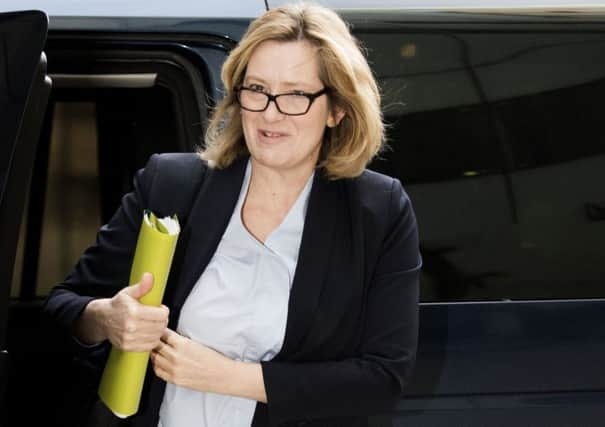Internet companies summoned over 'unacceptable' material


Amber Rudd said it was “completely unacceptable” that services like WhatsApp featured end-to-end encryption, preventing the security services from eavesdropping on conversations.
Her comments follow reports that Khalid Masood, the terrorist who killed four and injured dozens in a terror attack on Westminster last week, sent WhatsApp messages before launching his assault that cannot be accessed by police.
Advertisement
Hide AdAdvertisement
Hide AdInternet companies will be called to a summit with ministers this week to discuss how they can do more to police extremist material, Ms Rudd said.
In the wake of the Westminster attack, the Downing Street said the Prime Minister expects internet giants to do more to remove material used to inspire terrorism.
Yesterday Boris Johnson joined the criticism, saying it was “disgusting” that internet companies allowed extremist material on their platforms and said they should “stop just making money out of prurient violent material.”
In a BBC interview, Ms Rudd insisted the likes of Google, which runs YouTube, and WordPress had the same responsibilities as publishing companies and must take down extreme material.
The Home Secretary said she would seek a voluntary approach by assembling a board of the top internet companies and social media providers to examine counter-extremism measures, but she left the door open to changing the law if necessary.
She also revealed that a ban on laptops and tablets being carried as cabin baggage on inbound flights from a group of Middle East countries could be extended to all flights.
It was announced on Tuesday that passengers will no longer be able to carry large electronic devices on inbound flights from Turkey, Lebanon, Jordan, Egypt, Tunisia and Saudi Arabia in order to stop concealed bombs being brought on board.
Asked why such devices were not banned from all flights, Ms Rudd said: “It’s difficult to say how far this will go, whether we may at some stage arrive at that place.
Advertisement
Hide AdAdvertisement
Hide Ad“But at the moment the Government has made the decision on where to have that ban in place based on intelligence we’ve received.”
Europol director Rob Wainwright backed calls for reform of surveillance powers, claiming there was “inconsistency” in the relative ease with which security services could tap the phones of terror suspects compared to getting hold of their messages.
“Something has to be done to make sure that we can apply a more consistent form of interception of communication in all parts of the way in which terrorists invade our lives,” he said.
Ms Rudd told the Andrew Marr Show: “It is completely unacceptable, there should be no place for terrorists to hide.
“We need to make sure that organisations like WhatsApp, and there are plenty of others like that, don’t provide a secret place for terrorists to communicate with each other.”
However, she was mocked for suggesting tech companies were best placed to “understand the necessary hashtags” to stop extremist material being put up in the first place.
Commons Home Affairs Committee chairwoman Yvette Cooper said the government should consider Germany-style laws to fine companies that fail to remove extreme material, although Ms Rudd distanced herself from the idea.
Ms Cooper told Sky News: “Frankly, I think it’s not going to be enough for the government simply to have more meetings with them. I think we’re going to have to have much more pressure on them to act.